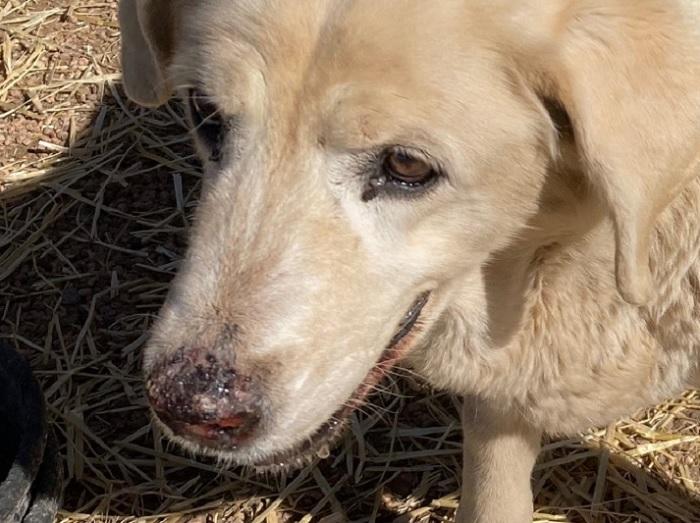
HNPK in Labrador Retrievers is a genetic disorder that results in the formation of crusty skin on the nose. This disorder can lead to discomfort and other complications. Although it's not life-threatening, it can affect your dog's quality of life.
This article will explore HNPK, its symptoms, causes, diagnosis, and treatment.
What Is HNPK in Labrador Retrievers?
Hereditary nasal parakeratosis is quite a mouthful. Let's break it down:
- hereditary = transmitted genetically from parent to offspring
- nasal = of, in, or relating to the nose
- para = prefix denoting a departure from the normal
- keratin = key structural material making up hair, nails, claws, and the outer layer of skin
- ...osis = often implies an abnormal or diseased condition
So HNPK is an inherited skin disorder affecting the nose and has been found only (so far) in Labrador Retrievers and Lab crosses such as doodles and dilutes.
To avoid producing it, at least one parent should be tested clear before breeding.
Symptoms
Affected dogs have dry, rough, brown, or grey crusts that develop on the surface and along the edges of the nose. It's often described as a "dry, crusty nose."
There may also be some bumps and/or a loss of pigment in the nose. Affected areas are also prone to bacterial infections that can become chronic. Dogs are otherwise healthy.
Although it's not a fatal condition, affected dogs suffer discomfort and pain if symptoms are not treated. In extreme cases, the dog’s nose will crack which leads to inflammation and continuous irritation.

Causes of HNPK
HNPK is a hereditary condition, meaning it is passed down from parents to their puppies. It's caused by a gene mutation that causes keratinization of the nose.
A puppy with two copies of the mutated gene will likely develop symptoms between six months to one year of age.
Diagnosis of HNPK
Your veterinarian will first perform a thorough physical examination, focusing on the condition of your dog's nose.
If HNPK is suspected, a genetic test can confirm the diagnosis. Often this is just a swab inside your dog's cheek to collect a DNA sample.
Cheek swabs
Owners can do the cheek swab themselves. The swabs are like Q-tips, except they are sterile and have a long wooden handle. Your veterinarian may give you some swabs, or you can order some when you order the test. You will need three swabs.
Make sure your dog has not had anything to eat or drink for at least an hour before you collect samples. Slide the swab between your dog's cheek and gum, then twirl it approximately ten times. Return it to the plastic envelope and repeat with a clean swab. Take a sample from your dog's other cheek with the third swab.
Put the plastic envelope with the three swabs into a paper envelope and seal it. Write your name plus your dog's name and breed on the outside of the envelope. Then put that envelope into a larger envelope. I use a 5x7" manila envelope. Address and mail to the laboratory. I like DDC because they're relatively fast and inexpensive. I also like that I can call to ask questions and place my order.
Treatment and management of HNPK
Unfortunately, there is no cure for HNPK. Treatment can help your dog feel better and improve his quality of life. This can include:
- Regular application of moisturizing creams or ointments to the nose
- Antibiotics or anti-fungal medications if an infection is present
- Using a plastic cone to prevent rubbing
- Regular check-ups to monitor the condition
Preventing HNPK
It's a genetic disorder that requires two copies of the mutated gene - one from the father and one from the mother. The only prevention is to avoid breeding two dogs that carry the mutated gene.
A puppy with one copy of the mutated gene will appear normal and won't develop symptoms.
To be sure puppies won't develop symptoms at least one parent must be clear of the mutated gene. One or both parents can be tested as detailed above. Another option is if one parent is "clear by parentage." In this case both the mother and father of one of the parents must be tested clear.
A dog with no symptoms but DNA testing shows he is a carrier of HNPK should only be bred to a clear dog. None of these puppies will develop symptoms, but some may carry the mutated gene.
An affected dog can also be bred, but it should only be to a dog tested clear. In this case, all of the puppies will be carriers but not affected.
In conclusion, although HNPK can't be cured, it can be managed with proper care and treatment. If you're a Labrador Retriever owner, it's important to be aware of this condition and check with your veterinarian if you notice any signs of HNPK in your dog.


